Gold, frankincense, and myrrh are special gifts with powerful meanings! Gold symbolizes Jesus' kingship, showing He's the King of Kings. Frankincense represents His divine nature, reminding us to pray and worship. Myrrh, however, hints at sacrifice, foreshadowing Jesus' future suffering. Each gift reveals something unique about Jesus' identity and mission. The Magi brought these offerings to honor Him, mixing excitement with deep respect. They reflect important lessons too, like humility and devotion. These gifts remind us of how extraordinary Jesus is! Want to uncover even more about their fascinating meanings? There's so much more to share!
Key Takeaways
- Gold symbolizes royalty and divine authority, reflecting Jesus as the King of Kings and acknowledging His unique status.
- Frankincense represents Jesus' divine nature and highlights the importance of prayer and worship in connecting with God.
- Myrrh signifies suffering and mortality, foreshadowing Jesus' passion and connecting His birth to His future role as the Messiah.
- The gifts collectively honor Jesus' multifaceted identity as King, Priest, and Prophet, emphasizing His mission for salvation.
- Their presentation by the Magi signifies recognition of Jesus' significance across cultures, showcasing the universal reach of His message.
Biblical Significance of the Gifts
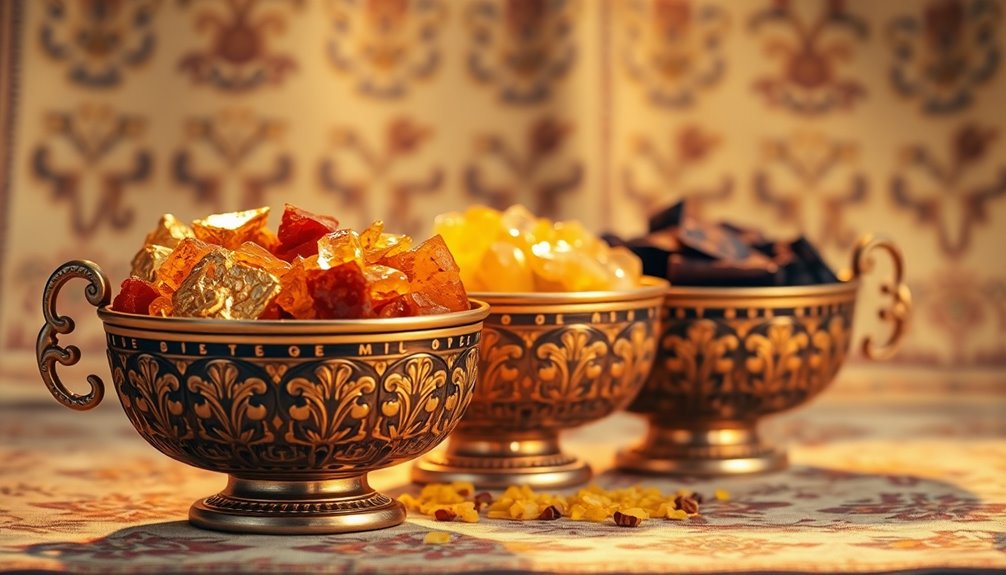
The gifts of gold, frankincense, and myrrh carry profound biblical significance, each representing a different aspect of Jesus' identity.
When you think about gold, it's not just shiny treasure; it symbolizes royalty! This reflects Jesus' divine authority as the King of Kings. You can see this idea in stories like 1 Kings 10, where the Queen of Sheba visits Solomon, showering him with gold.
Next, we've frankincense. This fragrant resin isn't just for nice smells; it signifies Jesus' divine nature. It was used in Temple rituals, highlighting His role as the ultimate high priest. Imagine how special that must've been!
Finally, there's myrrh. This gift hints at something much more serious. Myrrh was used for embalming and burial, pointing to Jesus' suffering and death. It connects to His passion, as told in the New Scriptures.
These gifts align beautifully with prophecies, like those in Isaiah 60, that talk about nations bringing gold and frankincense to honor the Lord.
Isn't it amazing how these gifts reveal such deep meanings? They help us understand who Jesus is and what He came to do!
Spiritual Meanings Behind Each Gift
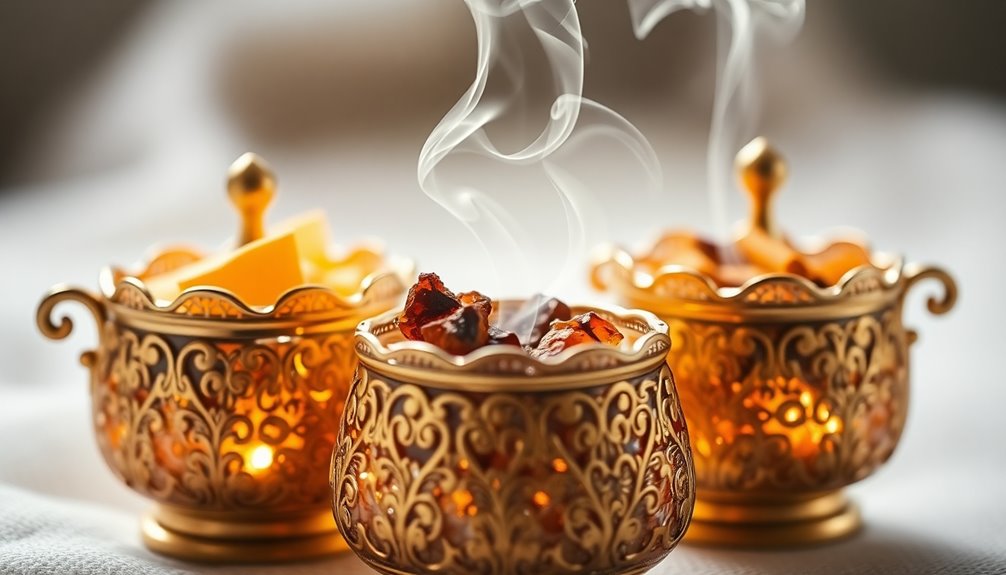
Each of the gifts—gold, frankincense, and myrrh—offers rich spiritual meanings that deepen our understanding of Jesus' life and mission. Let's explore how these gifts symbolize important aspects of who Jesus is.
| Gift | Spiritual Meaning |
|---|---|
| Gold | Represents royalty and divinity, showing Jesus as the King of Kings. |
| Frankincense | Symbolizes Jesus' divine nature and His role as a priest, reminding us of the importance of prayer. |
| Myrrh | Foreshadows Jesus' suffering and humanity, representing the sacrifices He made for us. |
Gold reflects His kingship, while frankincense highlights His connection to God through prayer. Myrrh reminds us of His suffering and humanity. Together, these gifts capture the mystery of the Incarnation. They acknowledge Jesus as both God and man.
When you think about these gifts, remember how they encourage you to give wisely, worship sincerely, and sacrifice for others. Each gift inspires you to live out the virtues they represent. So, as you reflect on gold, frankincense, and myrrh, let their symbolism guide you in your own journey of faith!
Moral Lessons From the Symbolism

Reflecting on the gifts of gold, frankincense, and myrrh reveals moral lessons that can greatly impact your faith journey. Each gift carries significant symbolism that teaches you important virtues.
Gold represents wisdom, encouraging you to recognize the royal nature of Christ. When you embody this wisdom, your thoughts and actions reflect nobility and honor.
Frankincense reminds you of the importance of prayer and worship. It urges you to cultivate a life filled with adoration and a deep connection to God. This connection can help you grow spiritually and strengthen your faith.
Myrrh signifies self-sacrifice and the willingness to endure suffering for a greater purpose. It inspires you to embrace daily sacrifices in your spiritual journey.
These moral lessons encourage you to live out your faith actively, showing humility, devotion, and resilience. Together, gold, frankincense, and myrrh highlight virtues that should shine in your life.
Embracing these lessons can help you navigate challenges with grace and love. So, as you reflect on these gifts, think about how you can incorporate their meanings into your daily life, spreading joy and wisdom wherever you go!
Historical Context of the Magi
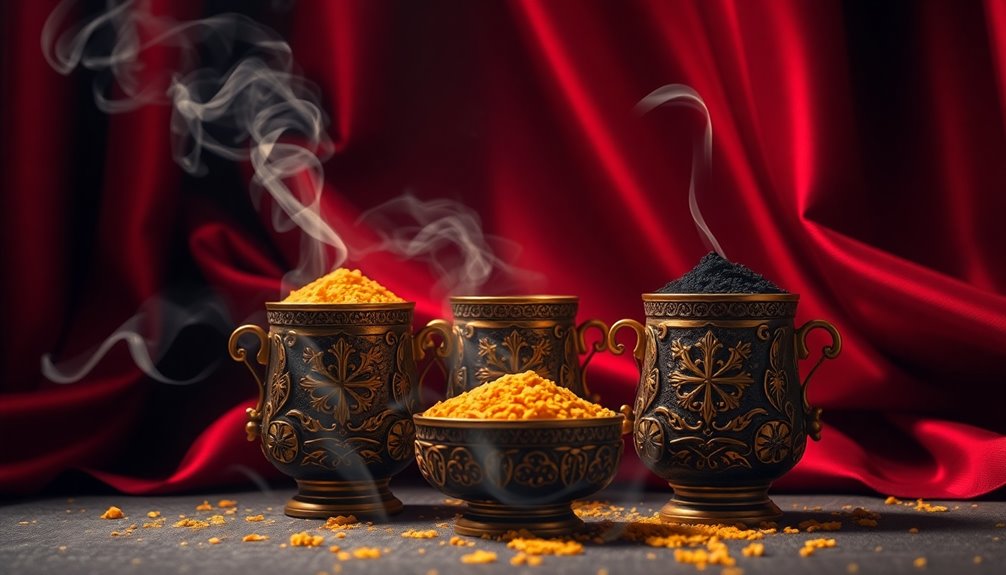
Traveling from distant lands, the Magi commenced on a significant journey that intertwined celestial phenomena with ancient prophecies. These wise men, possibly small kings or chieftains, came from the East, maybe from the court of Nabatean king Aretas IV. They followed a bright star, believing it to be a sign that Jesus was born. This journey wasn't just a simple trip; it was filled with purpose and excitement!
The historical context of the Magi reveals their deep understanding of both Zoroastrian and Jewish prophecies. They weren't just ordinary travelers; they represented a blend of cultures and knowledge.
The timing of their visit was essential, as Jesus was a toddler when they arrived. King Herod's decree to slay male children under two years highlights how significant this moment was.
When the Magi presented their gifts of gold, frankincense, and myrrh, they honored the new royal figure, showcasing the significance of the gifts. These offerings weren't just treasures; they reflected ancient diplomatic customs.
The Magi's journey reminds us of the excitement and joy surrounding Jesus' birth, making their visit truly special!
Theological Reflections on the Gifts
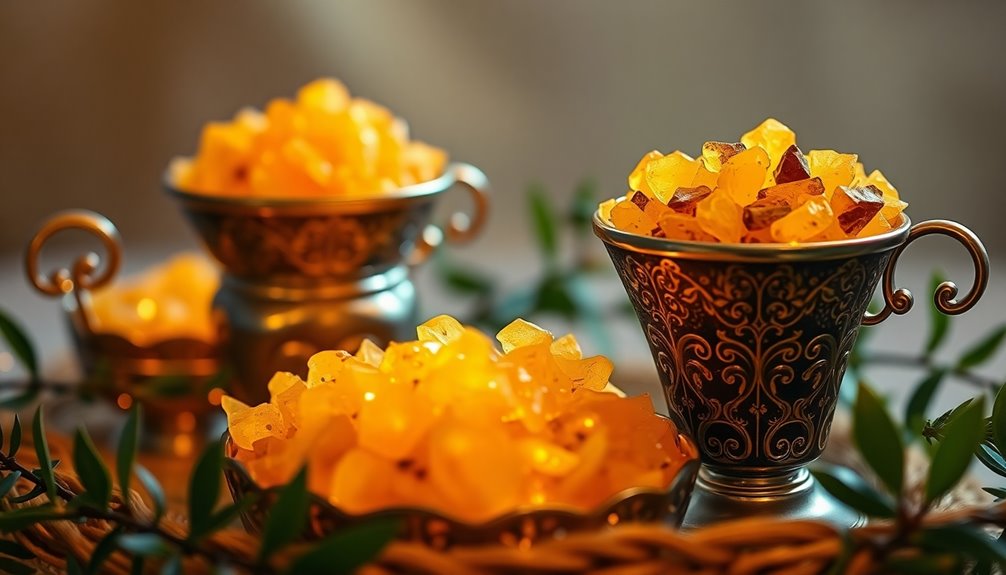
When you think about the gifts of gold, frankincense, and myrrh, it's exciting to see how they show us who Jesus really is!
Gold represents His royal kingship, while frankincense highlights His divine nature, reminding us of how holy He is.
Myrrh, on the other hand, points to His sacrifice, helping us understand the depth of His love for us through His humanity and suffering.
Divine Kingship Representation
The gifts of gold, frankincense, and myrrh offer a profound representation of Jesus' divine kingship, each item carrying deep theological significance.
Gold shines brightly as a symbol of Jesus' royal status. It shows His authority as the Messiah, fulfilling ancient prophecies about His sovereignty.
When you think of frankincense, imagine its sweet aroma rising to the heavens. This gift highlights Jesus' divinity and His special role as our high priest, reminding us that He deserves our worship as God in human form.
Myrrh, while often linked to suffering, plays a part in understanding Jesus' humanity. It's a reminder that He came to share in our lives and experiences.
Together, these gifts honor Jesus, recognizing Him as King, Priest, and Prophet. They reflect His multifaceted identity in Christian belief.
Each gift ties back to Old Scriptures prophecies, showing how Jesus' mission was part of a grand divine plan for our salvation.
Sacrificial Significance of Myrrh
Myrrh stands out among the gifts given to Jesus, carrying deep sacrificial significance that resonates throughout His life and mission. This precious resin symbolizes His suffering and mortality, foreshadowing His sacrificial death on the cross. Imagine the sadness when myrrh was offered to Him mixed with wine during His crucifixion, showing how it was linked to His pain.
Here are some key points about myrrh's significance:
- Myrrh was used in ancient embalming, making it a symbol of death.
- It highlights Jesus' humanity, connecting His birth to His passion.
- Myrrh was part of the anointing oil for priests, establishing Him as the ultimate high priest.
- The gift reflects the dual nature of Jesus—both divine and human.
- It serves as a reminder of the sacrifice He made to redeem us.
When you think of gold, frankincense, and myrrh, remember that myrrh reveals so much about Jesus' journey. It's not just a gift; it's a powerful symbol of His love and sacrifice for everyone.
Worship and Holiness Symbolized
Recognizing the significance of myrrh sets the stage for understanding the gifts of gold and frankincense, which together illuminate the profound nature of Jesus. Each gift plays a special role in showing us who Jesus is and how we can worship Him.
Gold, a symbol of kingship, reminds you that Jesus is the newborn King, full of divine authority. This gift encourages you to honor His royal status and recognize His rule in your life.
Frankincense represents Jesus' holiness and divinity. Used in worship, it highlights His role as our ultimate high priest. When you think of frankincense, imagine the sweet aroma rising to the heavens, just like your prayers and praises should. It inspires you to approach God with reverence and love.
Together, gold, frankincense, and myrrh remind us of the mystery of the Incarnation. They invite you to see Jesus as King, Priest, and God.
Every time you think of these gifts, let them lead you to deeper worship. Embrace their meanings, and you'll find joy in honoring Jesus' divine nature, sacrificial love, and royal identity as you grow in faith.
Significance of Gold

Gold holds profound significance in the context of the Nativity, representing not just material wealth but also the divine authority of Jesus as the newborn king. When you think about the gifts presented to Jesus, gold stands out as a symbol of His kingship and the recognition of His unique status.
Here are some exciting points about gold's significance:
- It's linked to royalty and wealth, showing Jesus' divine authority.
- Gold emphasizes God's presence, highlighting Jesus as Immanuel, "God with us."
- The gift of gold may have helped Joseph and Mary escape to Egypt safely.
- In ancient times, gold was a customary offering for significant figures.
- The symbolism of gold aligns with Old scriptures prophecies about Jesus' royal lineage.
These aspects of gold reveal its deep meaning. It's not just a shiny metal; it's a powerful symbol in the story of Jesus.
The three gifts—the gold, frankincense, and myrrh—together paint a beautiful picture of who Jesus is: a king, a divine presence, and a fulfillment of prophecies. Each gift tells a part of His incredible story!
Symbolism of Frankincense
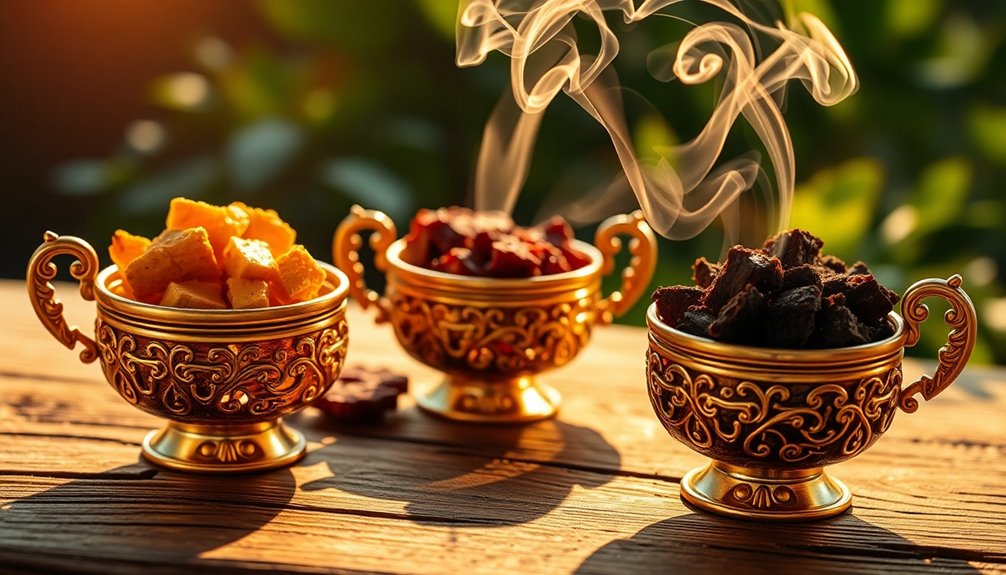
When you think of the gifts brought to Jesus, frankincense stands out for its rich symbolism and historical significance. This special resin, harvested from the Boswellia tree, was often used in worship. It represents holiness and righteousness, making it a meaningful offering.
In the Bible, you can find frankincense mentioned in Exodus 30:34-38, where it's included in the sacred incense used in the Tabernacle. This shows its strong connection to divine worship.
The Magi brought frankincense to Jesus, recognizing His divine nature and role as the eternal high priest. This gift wasn't just valuable; it was a symbol of honor, reserved for royal and divine occasions.
Imagine the sweet, aromatic scent filling the air, creating a peaceful atmosphere that enhances spiritual moments. When burned, frankincense brings a sense of calm, inviting everyone into a deeper connection during worship.
Meaning of Myrrh
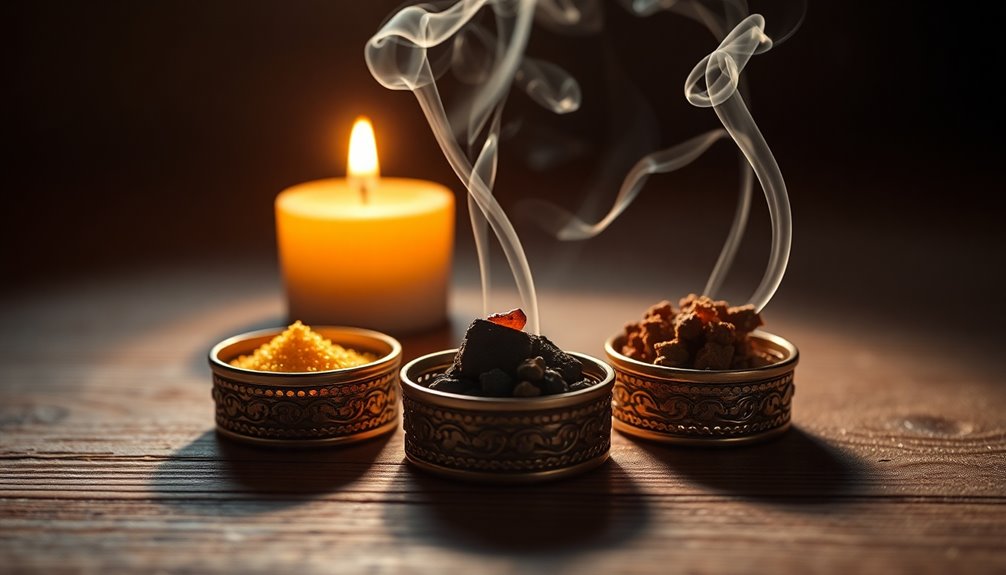
Myrrh has a fascinating history that connects it to burial practices and important symbols.
When you think about myrrh, you might see it as a reminder of Jesus' suffering and the sacrifices He made for us.
It played a special role in His life, showing us how deeply intertwined it's with love and hope.
Burial Practices Symbolism
Throughout history, myrrh has played a pivotal role in burial practices, symbolizing the deep acknowledgment of mortality and the preparation for death. This special resin, derived from the Commiphora tree, was often used in ancient cultures to honor the deceased.
It's fascinating to see how myrrh connects with significant moments in history, especially those related to Jesus.
Here are some key points about myrrh and burial symbolism:
- Embalming Agent: Myrrh was mixed with other substances to preserve bodies for the afterlife.
- Honoring the Dead: It was used to anoint the deceased, showing respect and love.
- Egyptian Traditions: Myrrh was especially important in ancient Egyptian burial customs.
- Biblical Connections: Myrrh was one of the gifts given to Jesus at His birth.
- Dual Significance: It represents both honor and mourning, linking joy and sadness.
Using myrrh in burial practices highlights how societies recognized the importance of life and death.
This connection enriches our understanding of historical rituals and showcases the lasting impact of myrrh, especially in relation to Jesus and His story.
Foreshadowing Jesus' Suffering
As we explore the meaning of myrrh, it becomes clear that this resin not only served practical purposes in ancient burial practices but also profoundly foreshadowed Jesus' suffering.
Myrrh was often used to prepare bodies for burial, reminding everyone of the sad truth that death is a part of life. When the wise men presented myrrh to the newborn Jesus, it symbolized His future role as the Messiah, destined to endure great suffering for humanity's redemption.
At Jesus' crucifixion, myrrh was mixed with wine and offered to Him as a pain-relieving potion. This shows how deeply connected myrrh is to His suffering and the pain He faced. It highlights the fragility of His earthly existence and the immense love He demonstrated through His sacrifices.
In this way, myrrh serves as a powerful symbol of Jesus' mission. Even in His early days, the gift of myrrh hinted at the challenges ahead, revealing the path of suffering that would lead to redemption.
Cultural Practices and Interpretations
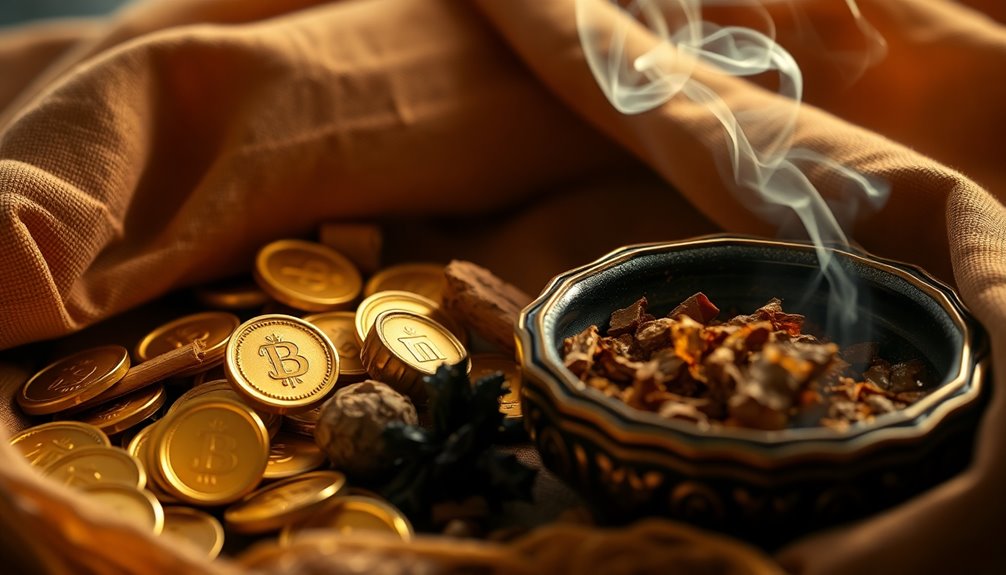
Historically, the gifts of gold, frankincense, and myrrh have played a significant role in cultural practices and interpretations surrounding royal and divine honor. These items were more than simple gifts; they carried deep meanings and connections to ancient traditions.
- Gold represented wealth and kingship, making it a fitting tribute for a newborn King.
- Frankincense was a precious resin used in worship, symbolizing the divine and its importance in religious ceremonies.
- Myrrh had medicinal uses and was also used in embalming, hinting at the themes of suffering and sacrifice.
- These gifts were often offered to royalty and deities, showing respect and honor.
- The Magi's presentation of these gifts blended diplomacy and spirituality, showcasing their cultural significance.
Through the symbolism of gold, frankincense, and myrrh, we can appreciate how ancient cultures expressed their beliefs and values.
These gifts remind us of the rich history surrounding the birth of Jesus and how they continue to inspire reverence and joy today.
When you think about these gifts, remember their deep meanings and the cultural connections that link past traditions to our present celebrations!
Insights From Biblical Scholarship
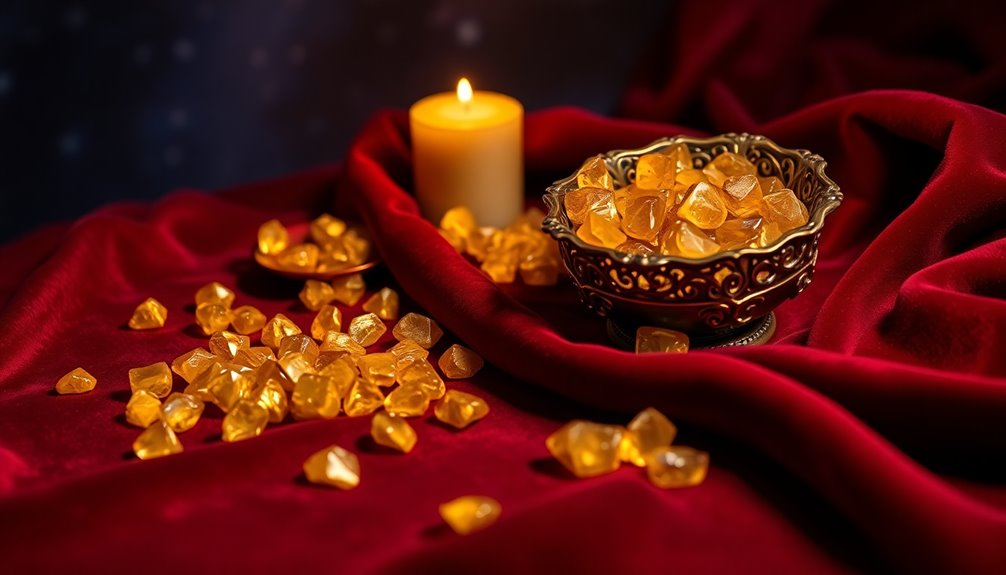
Delving into biblical scholarship reveals profound insights into the symbolism of gold, frankincense, and myrrh presented to Jesus by the Magi.
Scholars explain that gold symbolizes Jesus' kingship and divine authority. This aligns with ancient customs where people honored royalty, as seen in Isaiah 60:6. Imagine presenting a precious gift to a king!
Frankincense represents Jesus' divinity and His role as a priest. It was often used in worship and as an offering to God, highlighted in Exodus 30:34-38. This shows us how special Jesus is, connecting Him to divine worship.
Myrrh, on the other hand, is linked to suffering and death. Its historical use for embalming foreshadows Jesus' future passion and sacrifice, as noted in Mark 15:23. Together, these gifts reflect the acknowledgment of Jesus' identity as King, Priest, and Prophet, fulfilling many Old Covenant prophecies.
The visit of the Magi and their gifts also signifies Jesus' importance beyond Jewish culture. It marks the universal reach of His mission, reminding us that His love is for everyone, as celebrated in Revelation 7:9-10.
What an exciting message!
Frequently Asked Questions
What Does Frankincense Represent Spiritually?
Frankincense represents a special connection to the divine.
When you think of its sweet, aromatic scent, imagine it filling a space during prayer. It symbolizes holiness and purity, reminding you of the importance of worship and devotion.
Many people see it as a way to express their love and respect for God.
What Is the Importance of Frankincense and Myrrh?
Did you know that frankincense and myrrh were worth more than gold in ancient times? These precious gifts weren't just valuable; they held deep importance.
Frankincense symbolizes holiness, often used in worship, connecting people to the divine. Myrrh, on the other hand, represents healing and foreshadows suffering.
Together, they highlight the special identity of Jesus as king and savior. Their significance reminds you of the rich history and meaning behind these gifts!
What Did the Holy Family Do With the Gold Frankincense and Myrrh?
The Holy Family used the gold, frankincense, and myrrh in practical ways during their time in Egypt.
They likely spent the gold on travel, food, and shelter, helping them stay safe.
Frankincense might've made their living space smell nice and added comfort.
Myrrh, known for its healing properties, could have been used to care for their health.
Together, these gifts provided much-needed support during a challenging time in their lives.
Where in the Bible Does It Say Gold Frankincense and Myrrh?
You can find gold, frankincense, and myrrh mentioned in the Bible in the Gospel of Matthew, specifically in Matthew 2:11.
This exciting part of the story tells how the wise men, or Magi, brought these gifts to baby Jesus. They traveled from afar to honor Him, celebrating His special birth.
Each gift holds a special meaning, making this moment even more significant in the Christmas story.
Isn't that amazing?
Conclusion
So, when you think about gold, frankincense, and myrrh, remember they're not just fancy gifts! Gold shows Jesus as a king, frankincense highlights His divine nature, and myrrh hints at the tough times ahead. It's like a cosmic gift basket with a serious message. Who knew ancient gifts could teach us so much? So, next time you see a shiny gold ornament or smell some spices, you might just think of the Magi and their special gifts!










